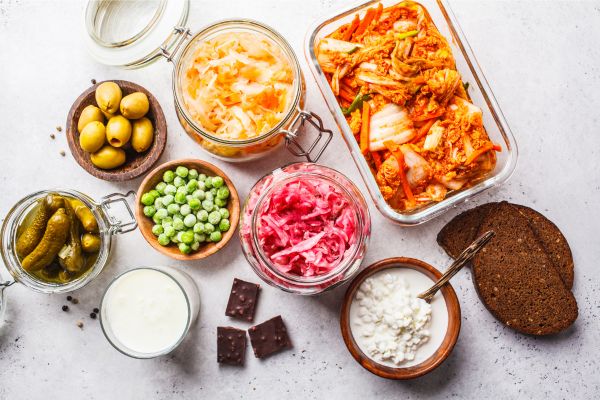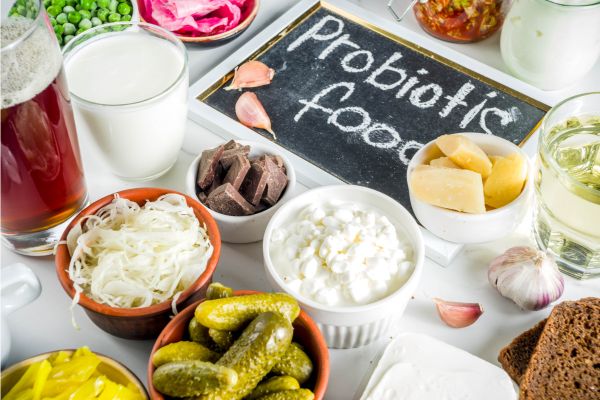In a world where mental health is finally getting the attention it deserves, a surprising ally in emotional well-being has emerged from the most unexpected place: your plate. Fermented foods — once considered merely traditional or cultural staples—are now being recognized for their profound impact on mood and brain chemistry. At the heart of this connection is serotonin, a neurotransmitter responsible for regulating mood, sleep, and emotional stability.

What Are Fermented Foods?
Fermented foods are those that have undergone a process in which natural bacteria feed on the sugar and starch in the food, creating beneficial compounds like lactic acid. This process not only preserves the food but also enhances its nutritional profile by producing probiotics—live microorganisms beneficial for gut health. Common fermented foods include yogurt, kefir, sauerkraut, kimchi, miso, tempeh, and kombucha. What ties all of these together is their ability to deliver healthy bacteria to the digestive system.
The Gut-Brain Axis: A Two-Way Street
The gut-brain axis is a bidirectional communication system between your gastrointestinal tract and central nervous system. It allows your gut to influence brain function—and vice versa. Through the vagus nerve and various biochemical signals, the gut microbiome sends real-time updates to the brain about what’s happening in your digestive system. Scientists now refer to the gut as the “second brain” because of its significant role in producing neurotransmitters and regulating emotions.
Serotonin: The Mood-Stabilizing Neurotransmitter
Serotonin is best known as the brain chemical that makes us feel happy and balanced. But interestingly, about 90% of the body’s serotonin is produced in the digestive tract, not the brain. Specialized cells in the gut lining synthesize serotonin, and its levels are directly influenced by the state of your gut microbiome. This means that maintaining a healthy gut is crucial for steady serotonin production—and, in turn, stable mood.

How Fermented Foods Support Serotonin Production
Fermented foods introduce beneficial bacteria that strengthen and diversify your gut microbiome. When your digestive system has a healthy balance of microbes, it enhances your body’s ability to produce and regulate serotonin. A 2019 study published in Nutrients found that individuals who regularly consumed probiotic-rich foods reported significantly fewer symptoms of depression and anxiety.
These probiotics not only influence serotonin production directly but also help reduce inflammation and oxidative stress—two known factors that negatively impact mental health. By reinforcing the gut barrier and modulating the immune system, fermented foods essentially help create a more serotonin-friendly environment.
Mood Stability and Mental Well-Being
The connection between fermented foods and emotional regulation is becoming more widely accepted. People who consume these foods regularly often report fewer mood swings, less stress, and more emotional resilience.
Take the story of Arjun, a 30-year-old graphic designer from Mumbai, who struggled with anxiety and fatigue. After incorporating homemade kefir and kimchi into his diet for six weeks, he noticed an improvement in both his energy levels and emotional stability. While not a substitute for therapy or medication, fermented foods offered him a natural boost in his mental well-being.

Scientific Studies Supporting the Connection
Recent studies have underscored the link between fermented foods and improved mental health. According to a 2020 report in Frontiers in Psychiatry, people who consumed probiotic-rich diets had a 32% lower risk of experiencing major depressive episodes. Another study published in the Journal of Neuroscience showed that mice fed Lactobacillus rhamnosus (a common probiotic strain in yogurt) exhibited less anxiety and produced more GABA—a calming neurotransmitter influenced by serotonin pathways.
Incorporating Fermented Foods into Your Diet
You don’t need to make major changes to start reaping the benefits. Simply adding a serving of yogurt with live cultures, a side of sauerkraut, or a glass of kombucha to your daily routine can make a difference. Look for labels that say “live and active cultures,” and when possible, go for unpasteurized varieties to ensure probiotic viability. Moderation is key—start small and observe how your body responds.
Food is a Therapy
As research continues to unravel the deep connection between the gut and brain, it’s becoming clear that food is not just fuel—it’s also therapy. Fermented foods, rich in probiotics, are a powerful way to support serotonin production and emotional stability. For those seeking a natural, accessible way to improve their mental health, the journey might just begin with a forkful of kimchi or a spoonful of yogurt.




